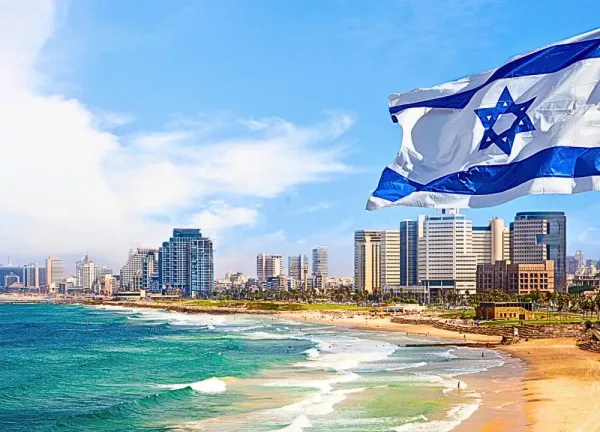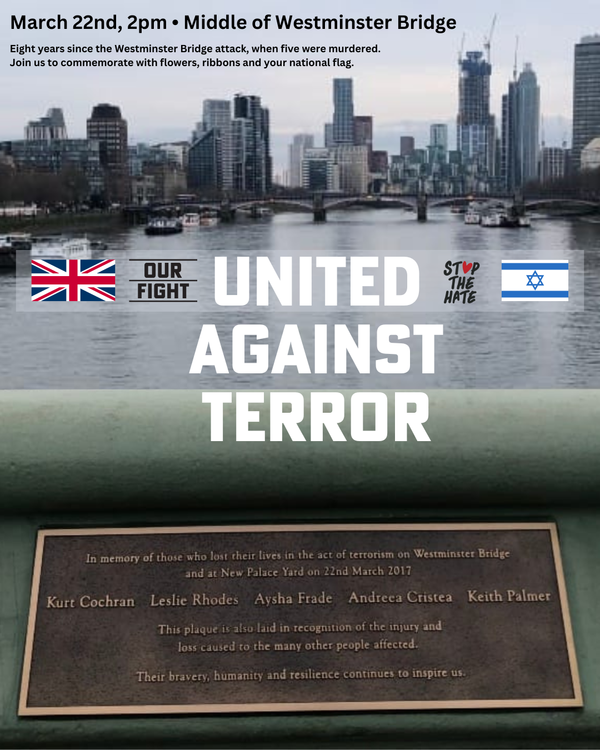AJEX March and Never Again is Now Vigil
Our Fight members were at the AJEX Momorial March and the CAAA vigil on November 19th. Mark Birbeck reports back.

Sunday afternoon was a busy one in London for those wishing to show solidarity with Jews and Israelis.
The afternoon began at the Remembrance Parade and Ceremony organised by the Association of Jewish Ex-servicemen and Women (AJEX). Hundreds of Jewish ex-military personnel marched to the Cenotaph, led by a brass band. Wreaths were laid in memory of many Jewish heroes, from those who fought in the British armed forces, to those who led the Warsaw Ghetto Uprising, to those who helped Jews escape the Anschluss.
The theme was 'Side-by-side'. The AJEX website asked for people of all ages and communities to "march, walk or watch, side by side in honour of the thousands of Jewish servicemen and women who fought for our freedom".
Thousands responded, and I’m glad I joined them.
I’d never heard of this annual event until recently, and without the vicious pogrom of October 7th, I would have probably remained unaware for another year. But October 7th was not just a massacre that invoked anger. Its aftermath was also a humbling demonstration of the capacity of the Jewish community and Israeli people to bind together with courage and fortitude. Inspired by this as the weeks have unfolded, myself and a growing number of concerned friends have felt the need to be present at such events, in a show of solidarity.
Immediately after the AJEX parade, a louder yet more sombre vigil took place. Organised by Christian Action Against Antisemitism, to replace a march in October that the police had advised them to cancel, family members representing hostages still held by Hamas spoke of the pain of having loved ones still in captivity.
Thomas Hand’s description of his "nightmare", having to think about what his daughter Emily was going through--she turned 9 last week--would have moved and angered every parent present.
But attending vigils such as these over the last 6 weeks--at Downing Street, Parliament Square, Trafalgar Square--led us to ask an important question; why did they mainly comprise Jews and Israelis?
Why, when tens of thousands marched each Saturday to oppose Israel, did so few non-Jews attend vigils each Sunday to support Israel. We needed to do more than just show up. We needed to establish a new kind of solidarity campaign.
For Israel
Although a key goal of this campaign would be to demonstrate that challenging anti-Semitism is for all of us, we also felt we must stand for Israel. Saying that Israel must exist, must decide whether it is appropriate to call a ceasefire, must not be left alone to fight international terrorism--it is a key principle that we should stand shoulder-to-shoulder with the very idea of Israel.
Against Anti-Semitism
We decided too that now is the time to speak up against all forms of anti-Semitism. To our friends and neighbours we say that it’s not enough to think you’ll be there when the windows are broken; each generation must re-make the promise of Never Again, and we need to re-make that promise today.
For Free Speech
And one last core principle is support for freedom of speech. At a time when many are calling for bans on demonstrations and limitations on what people can say or write, we want to avoid the fallacy that the challenge to anti-Semitism may come from closing Twitter accounts or a Police Commissioner’s favour.
Together these three principles provide the foundations for Our Fight.
We will be at vigils and marches, standing in solidarity with British Jews, with families of hostages, and with Israel itself. We will try to persuade other non-Jews, our friends and colleagues, that Israel is leading the fight against terrorism, and that to stand up against anti-Semitism today means standing 'side-by-side' with our Jewish friends and with Israel, and saying: your fight, is our fight.



